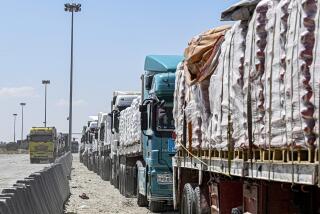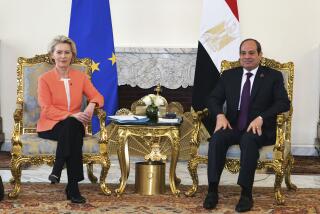The Nile, Egypt’s lifeline in the desert, comes under threat
- Share via
CAIRO — Overwhelmed by cascading economic and political problems since the overthrow of Hosni Mubarak, this nation teeters from within even as it biggest threat may lie hundreds of miles away in the African highlands. Buried in the headlines is the future of the Nile River — and thus the fate of Egypt itself.
Mubarak long neglected the security danger posed by other nations’ claims to the timeless pulse that provides 95% of this desert country’s water, without which its delta farmlands would wither and its economy die. As poor African capitals increasingly challenge Cairo, however, the struggle has become one of the most pressing foreign policy tests for Egypt’s new president, Mohamed Morsi.
African countries at the river’s source, notably Ethiopia, no longer feel bound by colonial-era agreements on water rights and are moving to siphon away larger shares of water for electricity, irrigation and business to meet demands of burgeoning populations.
It is a skirmish involving diplomats, engineers and veiled threats of war over geography’s blessings and slights and how nations in a new century will divvy up a river on whose banks civilizations have risen and tumbled.
“All of Egyptian life is based on the Nile. Without it there is nothing,” said Moujahed Achouri, the representative for the United Nations’ Food and Agricultural Organization in Egypt.
Morsi’s acknowledgment of the water crisis and his desire to reach a compromise to protect his country’s strategic and historical claim is evident: The Islamist leader has visited key Nile countries twice since his inauguration in June, and his prime minister, Hesham Kandil, is a former water and irrigation minister with connections to officials in African governments. An Egyptian delegation recently toured the region, listening to how Cairo might help build hospitals and schools in villages and jungles.
An advisor to the president quoted in Al Ahram Weekly said this of Morsi: “The man was shocked when he received a review about the state of ties we have with Nile basin countries. The previous regime should be tried for overlooking such a strategic interest.”
For decades, Egypt had concentrated on problems closer to home, including keeping the Arab-Israeli peace and tending to wars from Lebanon to Iraq. Mubarak, who survived a 1995 assassination attempt by Islamic extremists in the Ethiopian capital, Addis Ababa, had paid little attention to East Africa. But his regime was adamant — at one point hinting at military action — in preserving the existing Nile treaties.
That echoed a warning from his predecessor, President Anwar Sadat, in 1979: “The only matter that could take Egypt to war again is water.”
In a 1929 treaty and through other pacts, Egypt and its southern neighbor, Sudan, were granted the bulk of the Nile’s flow. The logic — filtered through decades of politics and power struggles — was that Egypt could not survive without the river. Nile basin countries, including Ethiopia, Uganda, Kenya and Tanzania, have seasonal rains and other water sources.
But economic pressure and increasing demand for energy and development have turned African countries’ attention to the Nile. Since 2010, Ethiopia, which now gets only 3% of its water from the Nile, and five other upstream countries have indicated they would divert more water and no longer honor Egypt’s veto power over building projects on the river.
The biggest challenge to Cairo is the Grand Ethiopian Renaissance Dam. Experts estimate that the hydropower project, which is under construction and is expected to cost at least $4.8 billion, could reduce the river’s flow to Egypt by as much as 25% during the three years it would take to fill the reservoir behind the dam. The project faces a number of potential setbacks and lost its biggest proponent when Ethiopian Prime Minister Meles Zenawi died in August.
Ethiopia has sought to reassure Cairo that Egypt’s annual share of 55.5 billion cubic meters of Nile water — about two-thirds of the river’s flow — will not be disrupted and that the new dam may provide low-cost electricity to its neighbors. But the Egyptians are suspicious.
“Egypt has entered a stage where its resources are depleting and population is rapidly increasing,” said Hani Raslan, an expert on the Nile basin for Al Ahram Center for Political and Strategic Studies in Cairo. “If the dam is complete … this will mean Ethiopia will turn into an enemy for Egypt because it will essentially threaten the country’s safety, development and livelihood of its people.”
He added, “Egypt would legally have the right to defend itself by going to war.”
The struggle over the river highlights decades of strained relations. Ugandan President Yoweri Museveni was quoted as saying before Morsi’s visit in October: “Despite the Nile River supporting livelihoods of millions of Egyptians from the ancient times to date, none of the country’s presidents has ever visited Uganda to see the source of this lifeline.”
Egypt and the other Nile nations are seeking to calm the rhetoric.
Officials say a resolution may include Cairo entering into long-term economic and energy resource agreements with neighboring capitals. The Egyptian delegation that recently toured the region included doctors and representatives of food banks, hospitals and charities.
Egypt, however, faces deep economic problems and is trying to attract foreign investment, which dropped sharply during last year’s uprising and ensuing political unrest.
“Morsi is trying to send signals to the African world that Egypt is opening up now, that he wants to improve relations and increase cooperation,” Raslan said. Morsi’s visits to Africa “are all just gestures.”
“No real agreements have been reached yet,” he said. “More needs to be done. Egypt wants and needs to reach its influence in the region.”
The essence of the Nile conflict is poor nations — Egypt and Ethiopia — needing the river for similar reasons. Ethiopia, which has experienced strong economic growth in recent years, wants to boost electricity output while spurring agriculture and development. Those needs also resonate to the north, but Egypt, which has no other water source, faces more dire prospects.
The crisis is certain to force Egypt, where regulations are tangled in bureaucracy and often ignored, to improve water conservation among the nearly 30% of its population that depends on farming for its livelihood. Much of the Nile Delta is made up of small family farms that for centuries have grown wheat, corn and rice with little environmental concern. This attitude and a growing population, which may jump from 82 million to 150 million by 2050, have put further strains on the river.
“Water policies in Egypt have to be long-range,” said Achouri, the U.N. official. “If you want farmers to stop using too much water for irrigation, alternatives and other incentives should be made available to them. Farmers right now cannot make a living without the Nile.”
A possible solution is rotating away from water-intensive crops, such as rice, and shifting to increased wheat production. Egypt, where the word “bread” also means “life,” is the world’s No. 1 importer of wheat. Agricultural experts say reducing rice production while increasing wheat yields would conserve water and meet the country’s food needs.
Such a scenario may be forced upon farmers if the Nile’s flow is curtailed and irrigation canals become parched. Egypt’s water and irrigation minister, Mohamed Bahaa El Din Saad, said recently that overpopulation, farming and other water uses have left the country with a “water deficit” of billions of gallons.
“More than 90% of the water for Egypt’s 90 million people is coming in from the Nile,” Achouri said. “The only way out is for more efficient use.”
Special correspondent Reem Abdellatif contributed to this report.
More to Read
Sign up for Essential California
The most important California stories and recommendations in your inbox every morning.
You may occasionally receive promotional content from the Los Angeles Times.











